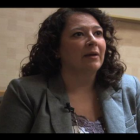

An 11-year-old denied making a threat and was allowed to return to school. Tennessee police arrested him anyway.
|
In late September, Torri was driving down the highway with her 11-year-old son Junior in the back seat when her phone started ringing.
It was the Hamilton County Sheriff’s deputy who worked at Junior’s middle school in Chattanooga, Tennessee. Deputy Arthur Richardson asked Torri where she was. She told him she was on the way to a family birthday dinner at LongHorn Steakhouse.
“He said, ‘Is Junior with you?’” Torri recalled.
Earlier that day, Junior had been accused by other students of making a threat against the school. When Torri had come to pick him up, she’d spoken with Richardson and with administrators, who’d told her he was allowed to return to class the next day. The principal had said she would carry out an investigation then. ProPublica and WPLN are using a nickname for Junior and not including Torri’s last name at the family’s request, to prevent him from being identifiable.
When Richardson called her in the car, Torri immediately felt uneasy. He didn’t say much before hanging up, and she thought about turning around to go home. But she kept driving. When they walked into the restaurant, Torri watched as Junior happily greeted his family.
Soon her phone rang again. It was the deputy. He said he was outside in the strip mall’s parking lot and needed to talk to Junior. Torri called Junior’s stepdad, Kevin Boyer, for extra support, putting him on speaker as she went outside to talk to Richardson. She left Junior with the family, wanting to protect her son for as long as she could ...

Report: Does Transferring Kids to Adult Court Deter Future Offenses?
|
Tuesday, the Office of Juvenile Justice and Delinquency Prevention (OJJDP) released “Transfer of Juveniles to Adult Court: Effects of a Broad Policy in One Court,” a new bulletin culling data from the Pathways to Desistance Study. The longitudinal report examined outcomes for juveniles transferred to adult courts in Maricopa County, Ariz., with the authors concluding that 77 percent of young people that returned to their community after being sent to adult facilities reengaged in at least some level of “antisocial activity,” with approximately two-thirds eventually arrested or placed in an “institutional setting.”
“Adolescents in the adult system may be at risk for disruptions in their personal development, identity formation, relationships, learning, growth in skills and competencies and positive movement into adult status,” the report’s authors wrote. Researchers said transferring young people to adult courts might have a “differential” effect, with some juveniles becoming likelier to offend again, depending on the young person’s presenting offense and previous offense history. Researchers state that adolescent offenders transferred to adult courts, without any prior petitions, were much likelier to be re-arrested than young people that remained in the juvenile justice system. “Most of the youth in the study who were sent to adult facilities returned to the community within a few years, varying widely in their levels of adjustment,” the report says.

Georgia Panel Vote on Key Juvenile Justice Reforms next Week
|
A blue-ribbon panel in Georgia is making the last tweaks to its recommendations for a statewide juvenile justice overhaul, ahead of a vote scheduled for Dec. 13. “There are ongoing meetings and discussions about a fiscal incentive model similar to Ohio,” said state Court of Appeals Judge Mike Boggs at a Dec. 4 meeting of the Georgia Special Council on Criminal Justice Reform in Forsyth, Ga. The so-called Ohio model, named for the state that pioneered it in the early 1990s, channels certain low-level offenders away from state custody and into locally-run diversion programs. The Georgia Council may recommend some formula to give financial incentives to counties for treating or diverting kids who are guilty of certain misdemeanors or things that are only illegal because of their youth, such as truancy.

He Wrote the Book on Kids and the Law: A Conversation with Georgia’s J. Tom Morgan
|
ATLANTA -- Criminal defense attorney and author J. Tom Morgan said his phone has rumbled late in the night with texts from minors seeking legal advice about police at the door. Today the high-profile lawyer specializes in defending young people, and, as a local district attorney in the past, prosecuted hundreds of people for crimes against children. In an upcoming article in the State Bar of Georgia’s journal, he argues that kids’ behavior hasn’t changed, but the consequences have. “Its not what’s happened in the last 30 years that kids are worse, it’s what we’ve done in our legal system,” he said. Things like zero tolerance, raising the drinking age and criminalizing consensual sex between teens under child abuse laws have put kids in the crosshairs of the police. Last year alone, he spoke at more than 100 events explaining to kids and adults the facts in his book “Ignorance is No Defense, A Teenager’s Guide to Georgia Law.”
JJIE talked to Morgan after he gave a presentation to some 150 parents at a private school in Atlanta on Nov.

Nebraska Pardons Board Cancels Hearings for LWOP Prisoners Convicted as Juveniles
|
The Nebraska Pardons Board cancelled this week’s hearings following the granting of an injunction request by more than a dozen prisoners, who said that the meetings, following the U.S. Supreme Court’s ruling in Miller v. Alabama, may result in them receiving prison sentences of at least 50 years. The Omaha World Herald reports that Douglas County Judge Thomas Otepka granted the request late last Friday, with the Pardons Board subsequently postponing several hearings scheduled for Monday and Wednesday. “Defendants are enjoined from commencing the commutation hearings scheduled for December 3 and 5, 2012, until such time as the Nebraska Supreme Court and the Nebraska Legislature addresses the constitutional mandates of Miller v. Alabama,” Otepka wrote. Two weeks earlier, Nebraska Attorney General Jon Bruning - a member of the state’s Pardons Board - said that he would likely give the prisoners, all currently serving life sentences for crimes they committed as juveniles, minimum 50-year sentences in hearings originally scheduled for this week. “We respectfully disagree with the court’s decision,” Bruning said.

Foundation Honors Champions of Juvenile Justice Reform
|
WASHINGTON, D.C. -- Arrested and convicted as a teenager, Starcia Marie Ague made a decision to escape her present and her troubled past by focusing on her education. She finished high school and began taking college courses while still incarcerated. Upon her release, she completed an associate’s degree at a community college in Spokane, Wash., and went on to graduate from Washington State University with a bachelor’s degree in criminal justice in 2010. This afternoon, Ague, who once spent six years in secure juvenile facilities, became the youngest person honored as a Champion for Change by the John T. and Catherine D. MacArthur Foundation, an award reserved for people who have demonstrated a commitment to improving the way things work in the juvenile justice system and who have creatively used the resources provided by the MacArthur Foundation’s Models for Change initiative to push for system reform. Six other people received the awards, announced today at the 7th annual Models for Change national conference in Washington, D.C. They are Lisa M. Garry of the Maryland Department of Juvenile Services; Laura Cohen of the Rutgers School of Law-Newark; Gene Griffin of the Northwestern University Feinberg School of Medicine; Arthur D. Bishop of the Illinois Department of Juvenile Justice; Sharon Guy Hornsby of Northshore Technical Community College, Florida Parishes Campus; and George D. Mosee Jr. of the Philadelphia District Attorney’s Office, Juvenile Division.

VIDEO: Voices of Advocates at the Models for Change Conference
|
The Juvenile Justice Information Exchange is at the 2012 annual Models for Change conference, a conference geared toward supporting a network of policy makers, government and court officials, advocates, educators, community leaders and families cooperating together in an effort to ensure that "kids who make mistakes are held accountable and treated fairly throughout the juvenile justice process." JJIE had the opportunity to catch up with several different officials from varying organizations about their goals and thoughts on the subject of juvenile justice. Continue checking in for ongoing updates. [Friday 12/7/12] [4:19 p.m.]
Jessica Sandoval, Director of National Field Operations at the Campaign for Youth Justice, talks about how her organization got its start and where its going in the future. [12:43 p.m.]
Rhonda McKitten, Director of Training and Senior Trial Attorney of the Juvenile Unit of the Defender Association of Philadelphia, shares a story about a teen who was positively impacted by one of her programs.
[Thursday 12/6/12] [2:14 p.m.]Nancy Gannon Hornberger, Executive Director of the Coalition for Juvenile Justice, shares an anecdote about a young person whose circumstances led to her being harshly charged in criminal court.



